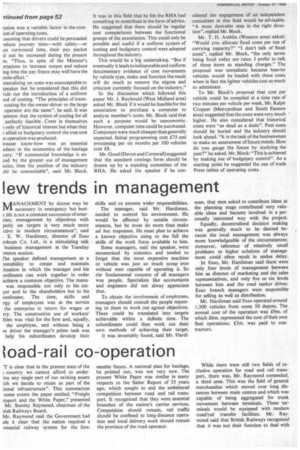lew trends in management
Page 56

If you've noticed an error in this article please click here to report it so we can fix it.
MANAGEMENT by decree may be necessary in emergency but busis life is not a constant succession of emercies; management by objectives with perly set targets is very much more ctive in modern circumstances", said . E. W. Hardiman, director of Esso roleum Co. Ltd., in a stimulating talk business management at the Tuesday :moon session.
['he speaker defined management as a Donsibility to create and maintain ituation in which the manager and his ordinates can work together in order achieve a common objective. The manawas responsible not only to his emyer and to the shareholders but to his ordinates. The time, skills and rgy of employees was at the service the enterprise in return for wages or try. The constructive use of workers' lities was vital for the firm and, equally, the employee, and without being a ve driver the manager's prime task was help his subordinates develop their skills and to assume wider responsibilities.
The manager, said Mr. Hardiman, needed to control his environment. He would be affected by outside circumstances, but he must do more than make ad hoc responses. He must plan to achieve a known objective using to the full the skills of the work force available to him.
Some managers, said the speaker, were mesmerized' by statistics and tended to forget that the most expensive machine or vehicle was just so much scrap iron without men capable of operating it. So the fundamental concern of all managers was people. Specialists like accountants and engineers did not alway appreciate that.
To obtain the involvement of employees, managers should consult the people reporting to them to work out agreed objectives. These could be translated into targets achievable within a definite time. The subordinates could then work out their own methods of achieving their target.
It was invariably found, said Mr. Hardi
man, that men asked to contribute ideas at the planning stage contributed very valuable ideas and became involved in a personally interested way with the project.
Equally, decentralized decision making was generally much to be desired because the local management was always more knowledgeable of the circumstances; moreover, reference of relatively small problems to higher echelons of management could often result, in undue delay.
In Esso, Mr. Hardiman said• there were only four levels of management between hint as director of marketing and the sales representatives, and only five or 'six levels between him and the road tanker driver. Esso branch managers were responsible for selling as well as distribution.
Mr. Hardiman said Esso operated around 1,300 vehicles from some 50 depots. The annual cost of the operation was E9m. of which am. represented the cost of their own fleet operations; £3m. was paid to contractors.












































































































































